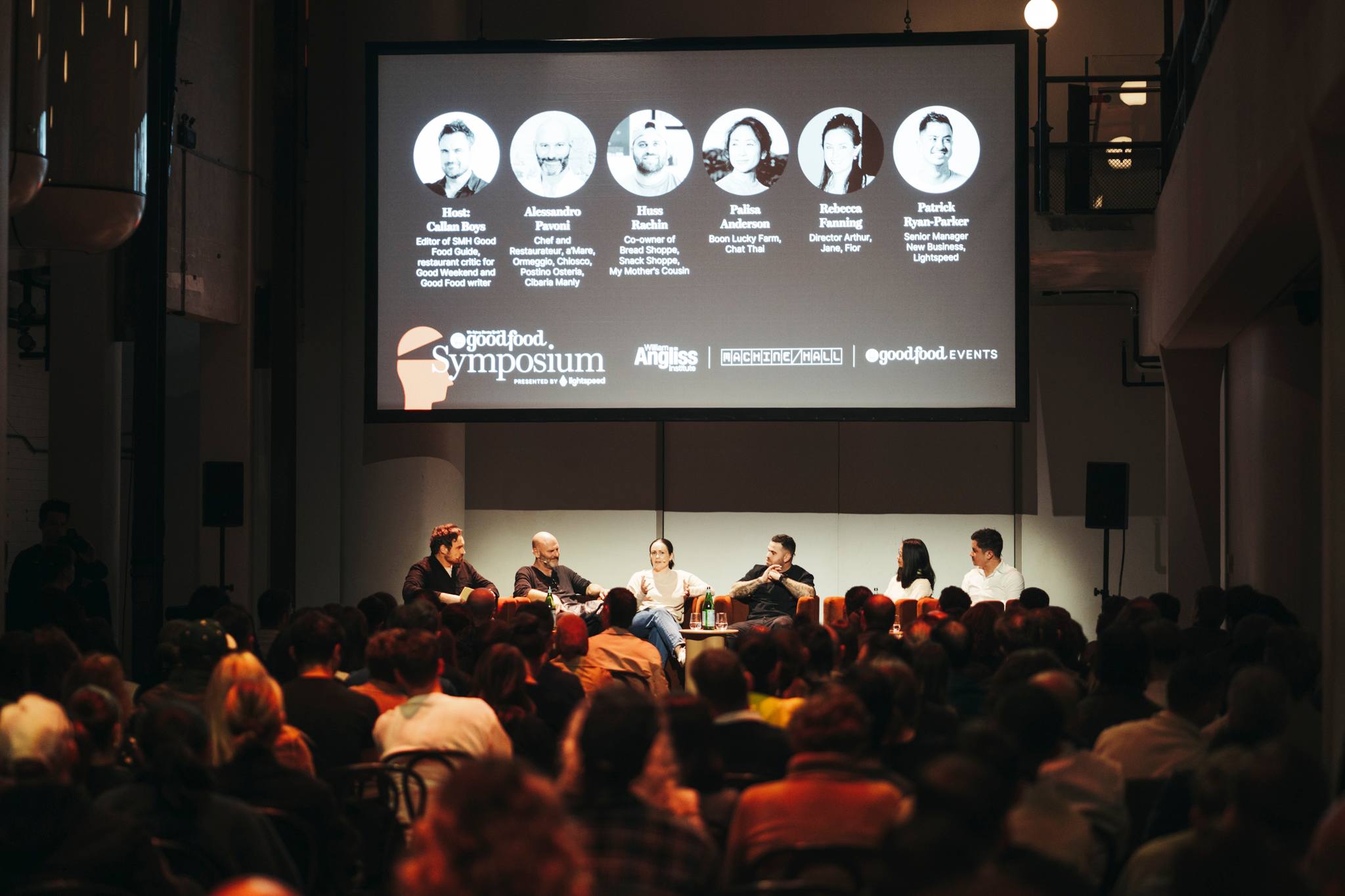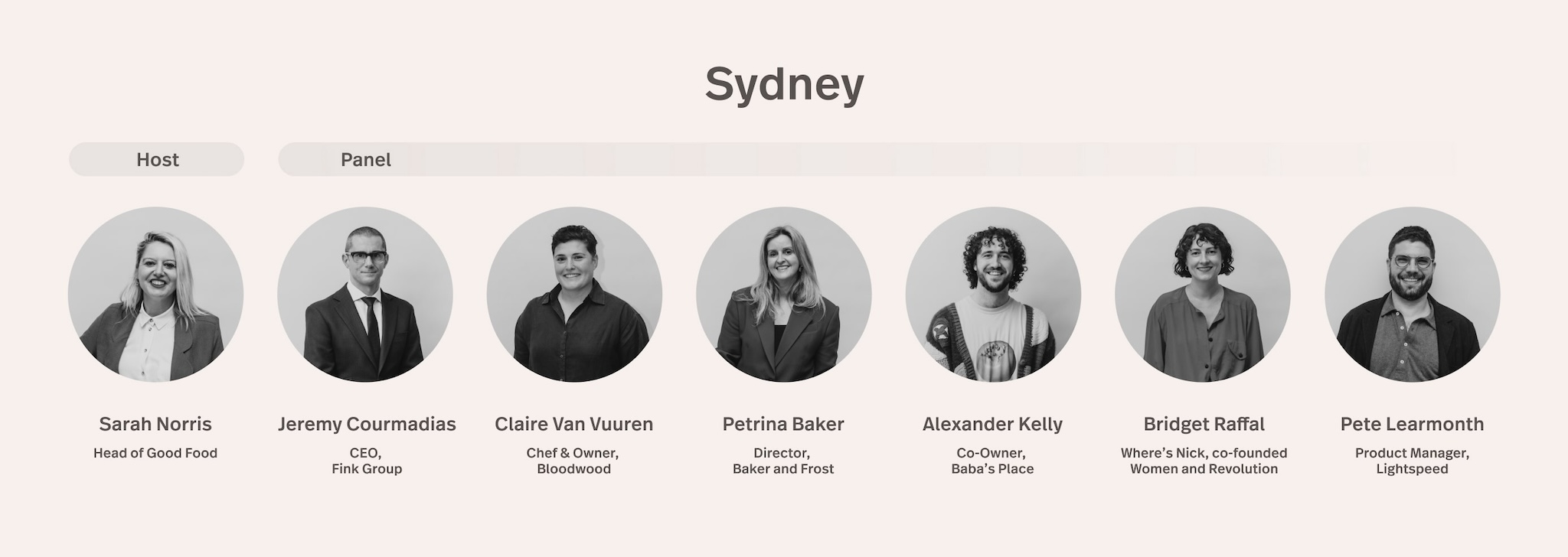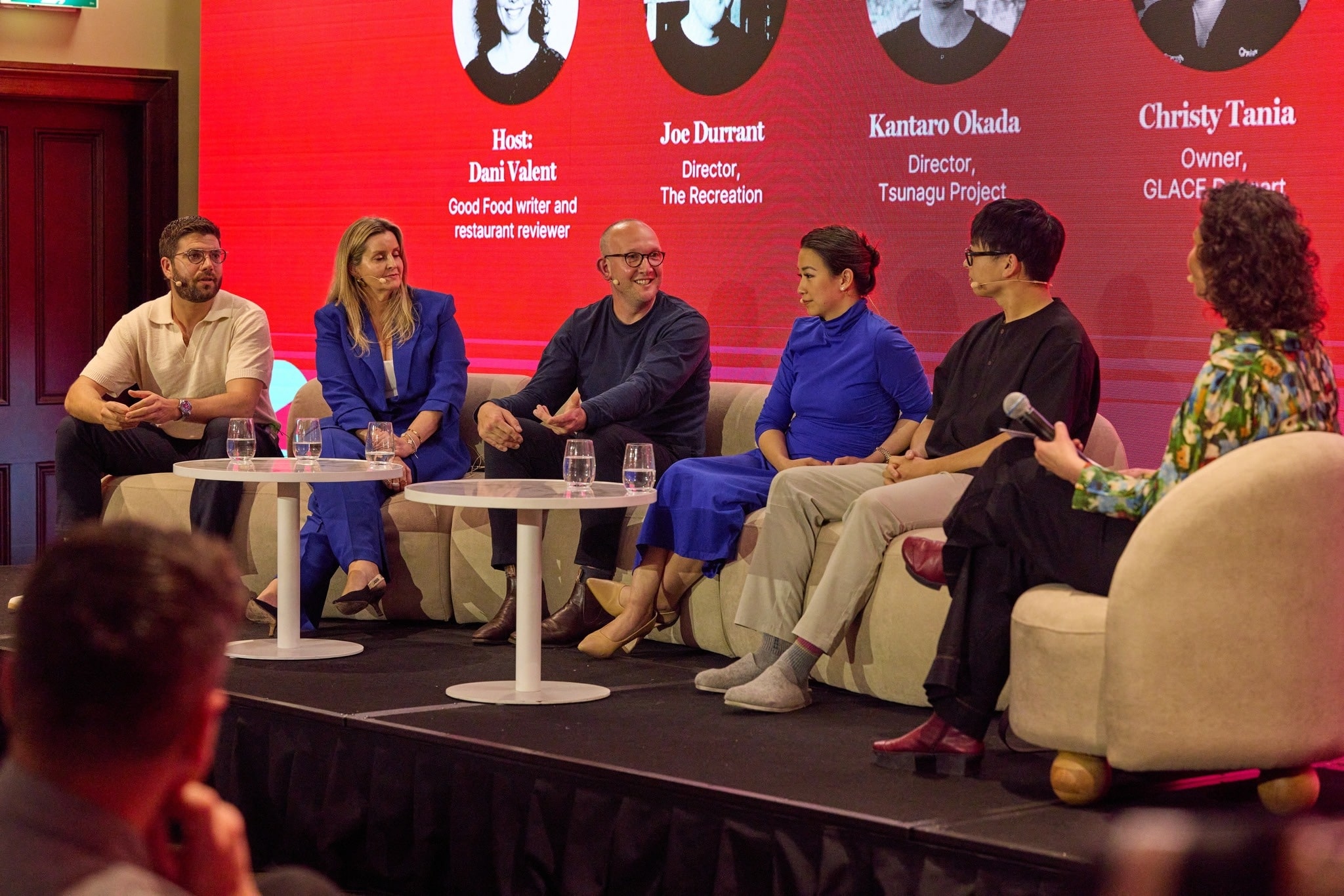
This year, Lightspeed was proud to be the presenting partner of the Good Food Symposium.
The Good Food Symposium is a first-of-its-kind series of free events that brought the hospitality community together for four solutions-focused panel discussions—two in Melbourne and two in Sydney.
It’s part of a new, ongoing Good Food initiative developed in response to the daunting number of cafe, bar, and restaurant closures we’ve witnessed this year.
The events, hosted in June and October, brought together some of the industry’s most prominent figures to discuss the current challenges facing the hospitality sector, engaging an audience of several hundred restaurant owners and industry professionals.
Why does the Australian hospitality industry need a symposium?
It’s no secret that the hospitality industry is facing challenging times, with the ongoing cost of living crisis, venue closures and several hospitality groups facing accusations of inappropriate behaviour and workplace harassment.
The Good Food Symposium aimed to tackle these pressing issues head-on—giving owners and operators a safe space to discuss the industry’s challenges.
During the June Symposiums, we witnessed an exchange of innovative ideas and engaging conversations around the difficulties of running a hospitality venue and how to navigate the constantly evolving customer dining experience.
The October Symposiums explored the hard-hitting issue of workplace culture with a thoughtful exchange of ideas and perspectives about the challenge of measuring success and the importance of fostering a safe work environment.
There were many positive discussions and incredible insights shared over the four symposiums, and it would be challenging to encapsulate everything in one article. So, we’ve taken the time to dissect each discussion, pulling together some key takeaways from each event.
June’s Good Food Symposium
Who was on the panel?


3 Takeaways
- Evolution of the dining landscape
- Changing perspectives on surcharging
- Coping with labour shortages
1. Evolution of the dining landscape
The June events began by exploring the ever-evolving dining landscape in Australia, with panellists giving their insights into how it has changed over recent years.
Evolve with the times
Takeaway: In an industry fraught with change, it’s crucial to evolve with the times to appeal to as many potential customers as possible.
“What hasn’t changed?” commented Rebecca Fanning. “Even at the moment, we’re thinking: Is fine dining as we know it going to exist? Are people going to want it?”
“We’re trying to target and cover as many people as possible, knowing that people still want to come out and really enjoy what we do. We want Arthur to thrive, and we do it according to what the current market wants from us.”
Casual is key
Takeaway: Since Covid, in the fine-dining world, there’s a demand for more casual dining—from the look of the venue to the style of service to the style of menu.
“Your business talks to you, and it spoke to me, and it said: Alessandro, you need to change,” commented Alessandro Pavoni.
People need to be confident they can go to a restaurant, and they don’t have to take out a mortgage to have a nice meal.”
“We’ve gone for more sharing, more family-style meals. I think people feel more comfortable with meals like that rather than tasting menus.”
Customer expectations
Takeaway: It’s becoming increasingly difficult to meet unrealistic customer expectations, especially in a climate of rising prices.
“The problem with customers is they don’t want to pay for bread… There are other things as well: Why are the chips so expensive?Why do I have to pay extra for tomato sauce?” Said Almay Jordaan.
“For years, we were like, it’s fine, it’s here on the pass, just pop it in a ramekin. But eventually, it does add up, and you need to start making a decision about what works… The idea is to have an open, solvent restaurant, and that’s what we were.”
Declining margins
Takeaway: While declining margins tighten finances, it is crucial to focus on some kind of investment in your business to strengthen it for the future.
“I guess the biggest difference we’ve noticed is the profit margin. It’s getting smaller and smaller,” said Kate Reid.
We are spending a lot of money at the moment and investing in the business to grow sustainably with staff and people that care about it. We’re future-proofing it.”
2. Changing perspectives on surcharging
Next, Lightspeed’s Patrick Ryan-Parker drew attention to the contentious issue of surcharging.
Almost everyone is surcharging
Takeaway: There’s a significant disconnect between customers and operators regarding surcharging, but in pressing economic times, venues can no longer afford to absorb these costs.
“While surcharging isn’t popular amongst customers, most hospitality businesses are implementing surcharges, whether for public holidays, group bookings, or the hotly contested merchant fee charge,” said Patrick.
Data from Lightspeed’s 2024 Hospitality Industry Report found:
- 99% of hospitality operators pass on some sort of surcharge to customers.
- Of these, 40% of hospitality venues pass on merchant charges.
- However, nearly 50% of customers take issue with surcharges
- 17% of those people ask not to pay it or consider never returning to that venue.
‘A 10% weekend surcharge is not enough’
Takeaway: Penalty wages at the weekend make it extremely challenging to open on a Saturday or Sunday without adding a surcharge.
“We do most of our trade on weekends, and it’s nice to have restaurants open on the weekend, right?” Said Rebecca Fanning.
Kate Reid reiterated this point.
“You look at Saturday and Sunday award rates, and if businesses didn’t charge surcharges, there’s a chance that they can’t open the doors. We see it these days; so many businesses that used to open on public holidays genuinely don’t now.”
Alessandro Pavoni expressed his concern around the imbalance—wages can be more than 200% higher at the weekend: “A 10 per cent weekend surcharge is not enough.”

3. Coping with labour shortages
The panel moved on to discuss one of the industry’s most pressing issues in recent years: labour shortages and the struggle to retain quality workers.
The need for overseas workers
Takeaway: Overseas workers are ‘the backbone of the industry’,yet the government isn’t doing enough to support them.
“Whether they are sushi chefs from Japan or pizzaolos from Italy… they are the backbone of hospitality,” commented Huss Rachid.
“The government is not doing enough, in my opinion… because it constantly introduces more red tape for businesses to allow overseas workers into their kitchens and to sponsor them.”
“It’s constantly changing the goalposts. As a collective, we need to lobby the government more: We need our voices heard.”
The challenge of keeping staff
Takeaway: Retaining quality staff once they’ve been hired is another hurdle for operators, and it’s essential to make your team feel as though they’re building a career.
Audience member Lis Davies, co-owner of hatted Paddington restaurant Ursula’s, questions whether staff are leaving the industry because they’ve seen how difficult owning a restaurant can be in the current climate.
“It’s not just a job; it’s a career,” said Alessandro Pavoni. “Share your vision for the future, get them involved in your vision, and help them grow with you.”
“We have had people grow with us for over 12 years. They’ve become like family; they’ve become geniuses in their field, and we feel lucky to have them.”
Power of the collective
Takeaway: Smaller venues could work together to provide incentives for their staff.
Rebecca Fanning has paired with other business owners to offer staff discounts across a broader range of venues, which is a greater incentive for incoming staff.
We’re working together instead of seeing each other as competitors.”
“It gives your restaurants [an advantage] with prospective employees who are comparing jobs, maybe with a large hospitality group like Merivale.”
October’s Good Food Symposium
Who was on the panel?


3 Takeaways
- Measures of success
- Importance of identity
- Changing workplace culture
1. Measures of success
The October events kicked off by discussing different measures of success and what success really looks like within the industry.
While financial success will always be an important metric to measure, it is not the sole indicator of a successful business or individual.
Christy Tania, owner of GLACÉ Desserts, perfectly encapsulated this sentiment.
“If we’re looking for success by financial measure, we’re in the wrong industry. We started in this industry because we’re passionate about it because we know we can bring something to the market that is different.”
Success is time
Takeaway: Success is about having enough time to spend on the business and being a parent.
“If I have time to be able to channel my creative outlet, if I have time to work on the business, if I have time to spend with my son and be learning something new—that is successful for me,” said Christy.
Success is good people and service
Takeaway: Success in hospitality is centred around good people and great service.
A successful restaurant is something that has really good people at the core of it.”
“I often ask people: “What is your favourite restaurant?” Said Petrina Baker. “And quite often, it’s the neighbourhood restaurant where they get extra breadsticks for the kids, or they know their name or what they want to drink.”
“It’s those little things. Food is so important but service is equally as important, and that’s what makes it really special.”
Success is work-life balance, staff retention and community
Takeaway: How you view success can change over the years, and it doesn’t have to be financially centred.
“Ultimately, your goal is financial success, but if you have a business that’s breaking even, then you’ve got a successful restaurant because it’s getting harder and harder, the bottom line keeps getting smaller and smaller, expenses continue to rise,” commented Claire Van Vuuren.
For me, 15 years in, I think work-life balance is definitely number one.”
“Staff retention, how your customers see you within the community and how you relate to your suppliers and your community are some of the biggest ways I’d measure success.”
2. Importance of identity
Next, the discussion moved on to the importance of brand identity and how it’s crucial to keep your identity front and centre in everything that you do.
Controlling your identity
Takeaway: Failing to manage your brand or intellectual property can spell disaster, so it’s crucial to stay in control and know what you stand for.
“Identity is an interesting concept because a lot of people associate that with your logo and your name. But your identity is so much more; it’s your IP and your IP is how you can scale and commercialise your business,” comments Petrina.
“I also think differentiation is key, so what you are not, as much as what you are.”
“For a lot of businesses, if you can explain your business in a sentence people will get it. Customers need to understand what you are about in an ever-crowded market; having that differentiation is really key.”
Stay true to your identity
Takeaway: Staying true to your identity is paramount, and it can impact the success and growth of your business.
“You have the nucleus of your identity, and then that goes out to your team and eventually to your customers, and they somewhat form your identity as well,” commented Joe Durrant.
However, it can be easy to lose sight of your original vision.
“Coming from a small business owner, identity is everything for us,” explained Christy. “We had issues initially because we just wanted to make money at the end of the day. So we did whatever the customer wanted. And then we lost track of that identity. In the end, we have to look at who we are; that will be our identity, and we need the customers to actually trust us for that.”

3. Changing workplace culture
Finally, the panel moved on to one of the biggest issues that has come to light recently: toxic and sometimes unsafe work environments.
Allies and accountability
Takeaway: Workplace culture across the industry needs to change, and there’s a pressing need for accountability and allies.
Bridget Raffal tackled this tough conversation head-on.
“I’d like to see a little bit more respect in the culture in general… People need to be held accountable and do better,” says Bridget. “Culturally, I think it’s a huge problem in the industry that problematic figures, often men, who are known to be offenders, don’t get moved out of positions. Or if they do, they get moved from one venue to another just to unleash them onto a different group of people and create another unsafe work environment.”
You just shuffle this problem around the industry—and we all know that it happens… I think it would be great for male leaders in the industry to step up and be allies.”
Creating safe environments
Takeaway: Taking a proactive approach, like introducing anonymous feedback, can foster a safer work environment.
“We recently started anonymous feedback for the whole team. It was very scary; it’s kind of like reading Google Reviews: I don’t want to see it… but you have to,” commented Kantaro Okada.
“It was really great, there were lots of positives and obviously some negatives—that give us a chance to show them that we really respect the feedback and we want to change for them and make it a better working culture.”
Respecting people’s time
Takeaway: Hospitality has a stigma for long hours and underpaid workers, which leads to high staff turnover. However, the industry is making changes when it comes to work hours and paid overtime.
“10 years ago, it was normal that you were underpaid and worked unpaid overtime,” comments Joe. “I think that’s a really small percentage of the industry now… Look how far we’ve come in a relatively short time.”
“Babas has always tried to be employee-forward,” commented Alexander Kelly. “Right from the get-go, we wanted to offer everyone full-time contracts, we wanted to minimise temporary work… we try to keep on top of overtime.”
“Another thing we do is half-yearly catchups—where we provide the space for people to speak their mind—where the business is at, where they’re at.”
The customer isn’t always right
Takeaway: Operators need to be more confident in the notion that the customer isn’t always right, and they have a duty to protect their staff from inappropriate behaviour.
Bridget explains how they have a ‘creep check’ in Where’s Nick? And venue management has very strict rules about customers having to respect staff.
“The policy is the venue will always back the staff member, and we’re comfortable having those conversations and saying what is allowed in the space and what is respectful,” comments Bridget.
“People can’t come in and treat staff however they want just because they’re spending money. If we lose a guest over it, we say: that’s fine, they’re not our people, and we are not the space for them.”
The importance of conversation
We firmly believe the conversations across the four symposiums, from staff shortages to surcharging and workplace culture, are incredibly important. The events created a safe space for those in the industry to gather and discuss the most pressing issues that are impacting venues, and it’s crucial to keep the conversation going into 2025 and beyond.
We were privileged to be part of the 2024 Good Food Symposiums and firmly believe events like this are paramount to helping Aussie venues thrive and be the best they can be. We’d like to extend a heartfelt thank you to The Good Food team for launching this series—your vision is bringing much-needed conversations to the forefront of our industry.

News you care about. Tips you can use.
Everything your business needs to grow, delivered straight to your inbox.


